Early 2018 is shaping up to be pretty thin when it comes to video game releases I actually care about. Sure, I’m looking forward to the new Tomb Raider and Mega Man games (and honestly I’m all in for Death Stranding, whatever the heck that ends up being), but the beginning of the year is a bit boring. I looked back at a few “Best of 2017” lists to see what games I missed, and an Indie game called Doki Doki Literature Club piqued my interest.
DDLC is free (or pay what you want) on Steam or itch.io and only takes a few hours to complete. The game ends up turning into something totally different than it seems at first glance, so if you really want to play it I would urge you to do two things:
- Take all the disclaimers very seriously and decide whether or not you actually want to proceed.
-
If you’re sure you’re okay to play, jump into the game without reading anything more about it.
(This is the part where I tell you there will be spoilers below, but I promise I won’t include anything too graphic.)
It’s clear that DDLC wants to subvert your expectations from the moment the game opens. Three different content warnings are displayed before you even get to the main option screen, but they’re paired with bubbly anime-style graphics and light, fun music.
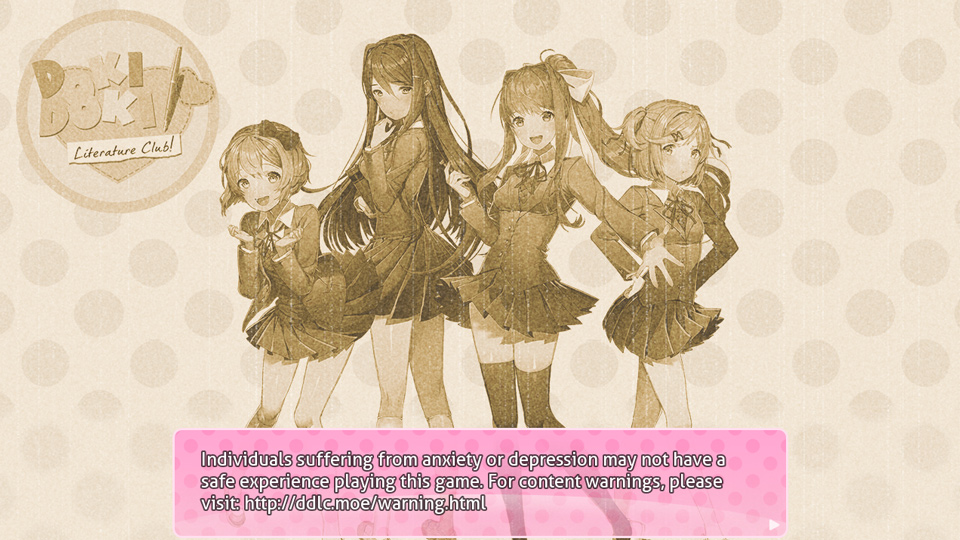
After agreeing to the disclaimers, the game starts off like most romantic visual novels. You play, unfortunately, as a teenage boy who is kind of a jerk. Your childhood friend, Sayori, insists that you need to take up an after school activity, and she has the perfect one in mind: the Literature Club! You go along with her, though you have no intention of joining — that is until you find out that the club is full of cute girls.
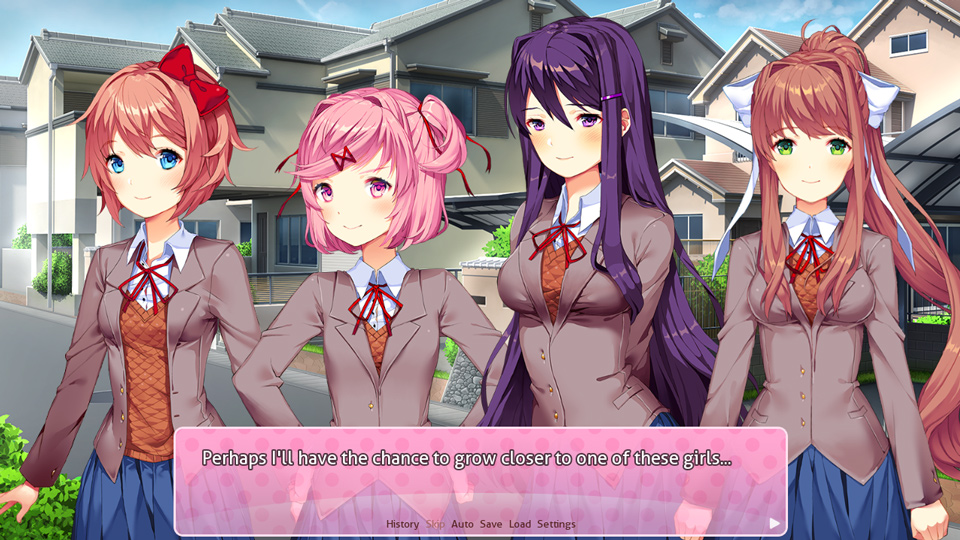
Lack of female agency is a long-standing trope in dating sims, and DDLC leans on it heavily at the beginning of the game. As soon as you arrive at the Literature Club, it’s clear that the girls are automatically yours for the choosing. But instead of actively trying to steer my character toward anyone, romantically, I hoped that they would all just date each other.
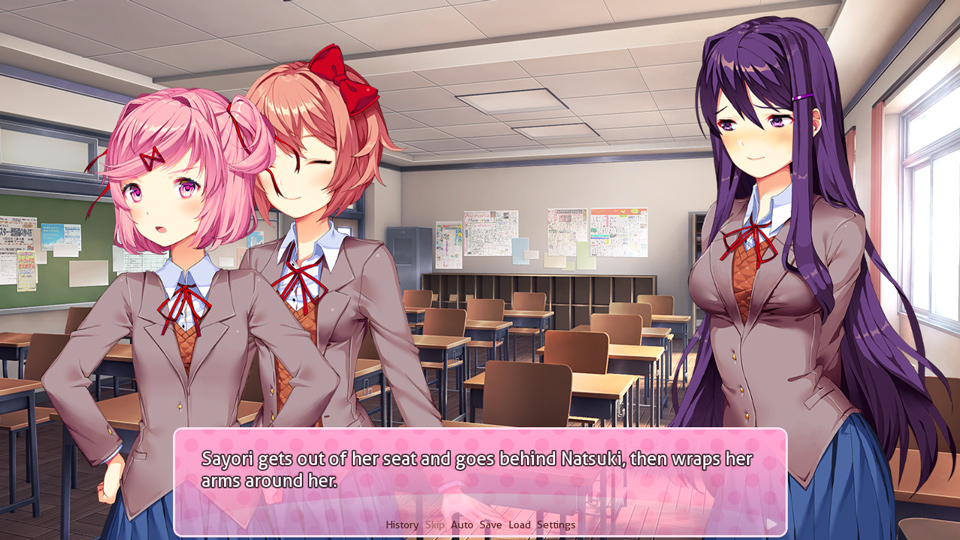

Early on, the main game mechanics are simple; even for a visual novel, DDLC is on the light end of the interactivity spectrum. The only choices you can make are which words to include in the poems you write for the Literature Club and which girl you want to share them with first. The rest of the first act establishes the characters, as well as including a whole heap of foreshadowing and a vague sense that things are not quite right.
Because I knew a bit about the game’s plot before I started playing, I found myself impatiently waiting for the shift from romance into horror. I expected the twist — Sayori’s suicide — to happen suddenly (like a jump scare), but instead the game establishes her depression early. By the time you’re about to find her body, you can guess exactly what’s happened. Your character blames himself and his choices, but Sayori’s suicide is inevitable.
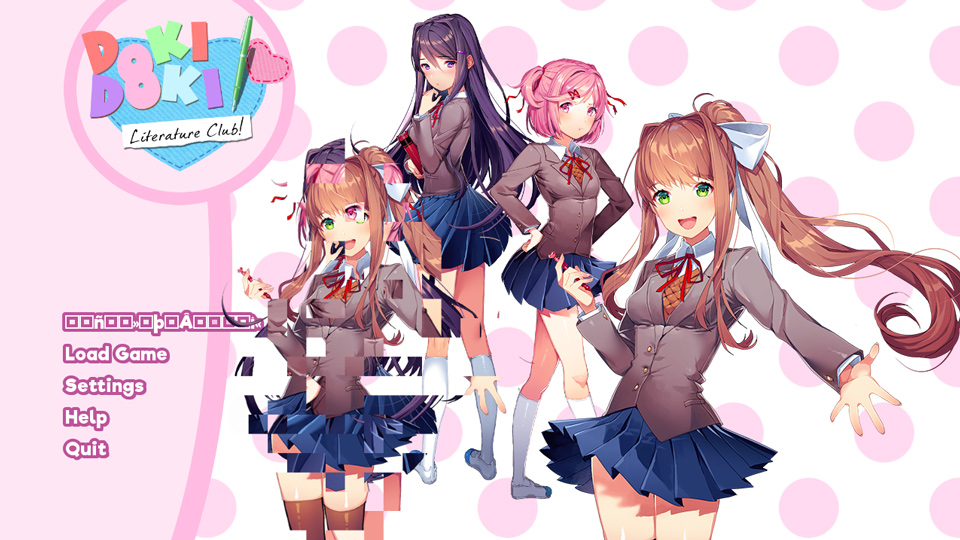
Sayori’s death is the turning point for DDLC, and now shit really starts to get weird. After ostensibly ending quite abruptly, the game reloads the main option screen — but this time some of the content is corrupted.
The second playthrough begins as though Sayori never existed, though the game glitches in the places she is supposed to be directly referenced. In this universe, you join the Literature Club because of Monika, the club’s president, instead of Sayori. The game gets increasingly unsettling as the other two remaining girls in the club, Yuri and Natsuki, viciously vie for your affection.
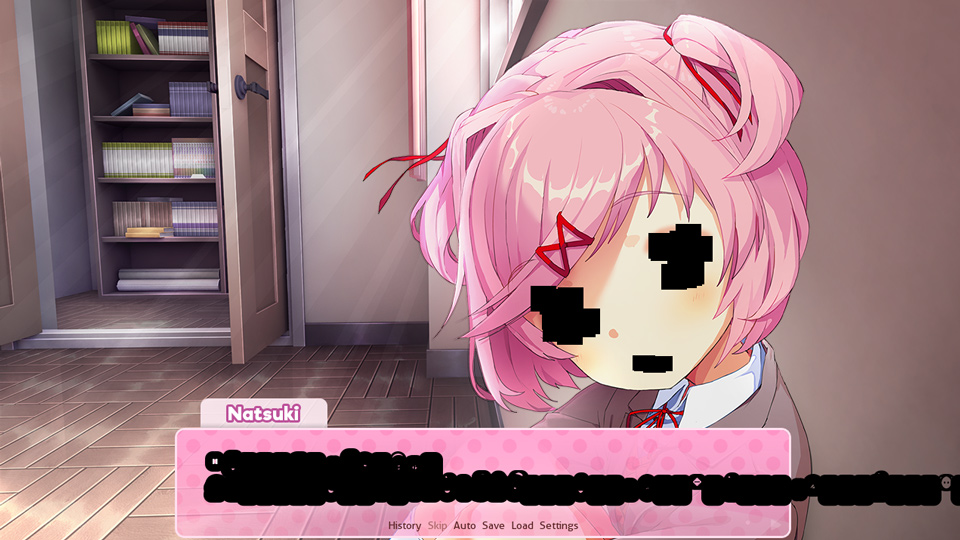
In this playthrough, Monika’s interference becomes more and more obvious: she breaks the fourth wall, she seems to be controlling the actions and memories of the other girls, she limits your choices in the game so you can pick “Just Monika.” Things come to a head when another of the girls, this time Yuri, kills herself violently, and you are left alone with her body for a whole weekend.
Monika apologizes for the game’s broken script, deletes Yuri and Natsuki’s character files, and takes you away to an empty room. Monika’s known it’s a game the whole time, you see, and all she wanted to do was make you fall in love with her. And it’s such a disappointing reveal! The game acknowledges the lack of female agency in the genre, but makes no actual attempt to subvert the trope.
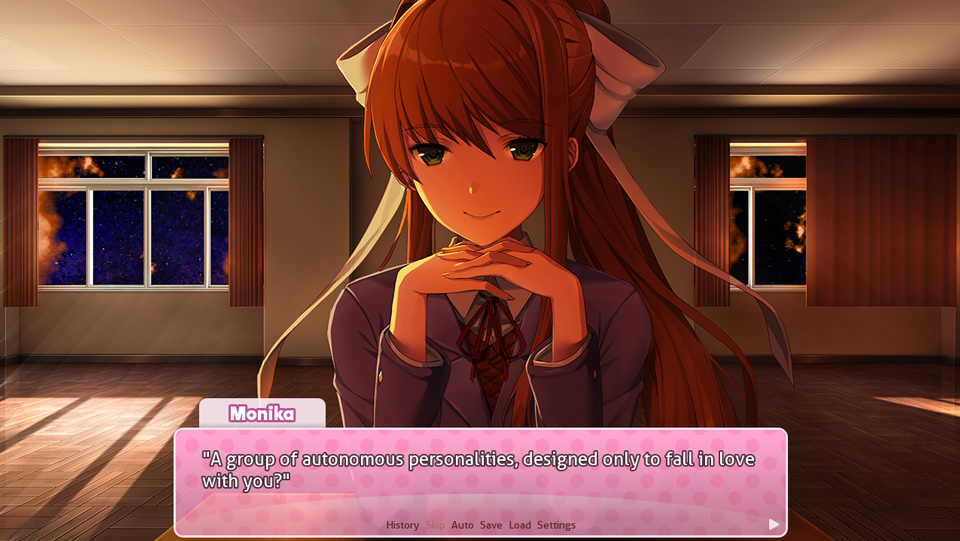
Instead, the game turns Monika — arguably the only girl with any agency at all — into another trope altogether: “the obsessed stalker.” She traps you in the empty room, tells you she loves you, and forces you to choose yes when she asks you out. At this point, the game introduces a novel mechanic: you have to actually find and delete Monika’s character file in order to get out of the room.
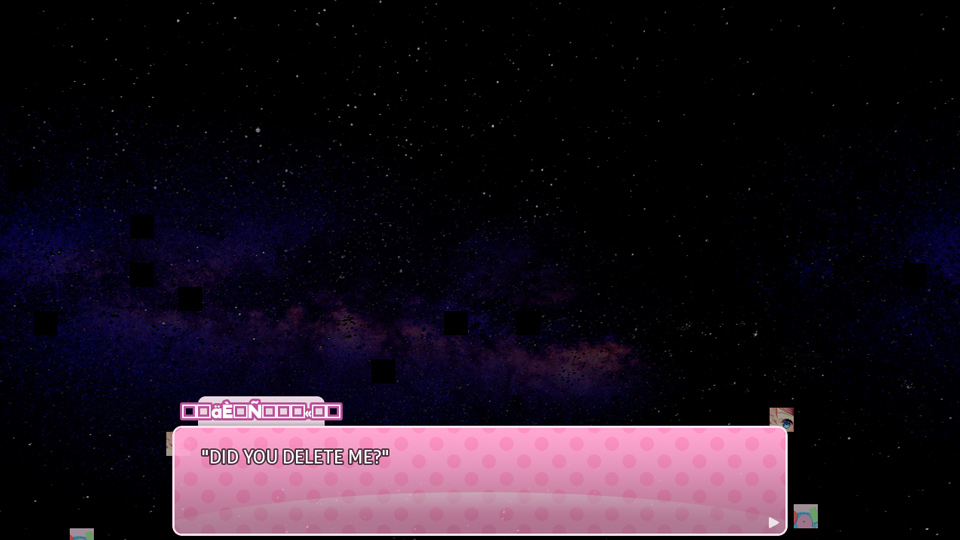
The game starts over again, this time without Monika, and it seems like everything will be fine. Before long, however, it’s revealed that Sayori, the new club president, is aware of everything that happened in the previous playthroughs. She goes full-Monika-crazy and tries to take you away to the empty room again, but actual Monika somehow intervenes. She realizes now that nothing good can come from the Literature Club, and deletes everything, ending the game for real.
As a horror game, DDLC definitely succeeds in delivering scares — a mix of a few startling moments, graphic images that are hard to forget, and a general and persisting sense of creepiness and despair. And the game is clever, sure, but ultimately I was left disappointed. Rather than simply acknowledging the ridiculous trope of no female agency in dating sims and attempting to explain it away from a meta perspective, I wish the game had instead just given the girls more agency. For an experience that was clearly designed to flip expectations, DDLC missed a huge opportunity and fell flat for me.








Comments
Thanks for writing this! I tried playing DDLC knowing full well what I was getting into, but the intro was just soooooo grating that by the time I hit Sayori’s suicide I didn’t feel like I had enough to keep me going.
To me it was really disappointing because (SPOILERS SPOILERS SPOILERS SPOILERS SPOILERS) the game prior to the metafictional twist felt like a spot-on depiction of abusive friendships, and I was really interested in seeing that story. (Also, this comment turned out a bit longer than I expected, so I’m breaking it up into nested comments so as not to take up the whole page.)
If you’re looking closely at Monika’s behavior in the first act, it’s actually extremely cruel even then (she’s constantly acting to keep everyone from getting any more of the spotlight than she is, putting everyone down, pitting them against each other, preventing them from doing anything to actually solve their interpersonal conflicts, pushing to get her way even if it makes everyone else uncomfortable, needling them about their mental illnesses, etc) and in the context of being part of a friend group like that, it made perfect sense to me why every girl was throwing herself at you – no matter how much they’d be interested in you in a more normal situation, in this situation it’s the one avenue towards validation (or even towards besting each other) that any of them have. It felt like the story was less about dating sim tropes and more what would drive people to behave like dating sim tropes (not only in terms of how everyone was competing for the protagonist, but in terms of how their anime trope behavior seemed more like how people who read too much can end up imitating tropes in an attempt to have the kind of personality they want rather than the kind of personality they have) if not “because this is wish fulfillment for the player”… and then no, it was actually just “because this is wish fulfillment for the player” all along, but spoooooooooky. Like, the reason they didn’t have their own motivations for their behavior was because the writer decided they didn’t get to have their own motivations for their behavior.
Also, while I don’t particularly feel like fiction that deals with mental illness should have to meet any specific standard of being socially responsible, especially because different mentally ill people have different reactions to different depictions of mental illness – I find character arcs that end in a completed suicide to be validating (because the lack of a happy ending makes the portrayal of the suffering involved feel more real) and character arcs that end in a suicidal character being saved to be really easy to get wrong in a way that’s absolutely horrifying (the character being saved instantly, the character suddenly getting a more cheery personality and ditching any “darker” interests) and those preferences go against all conventional wisdom about how to write suicide – DDLC extremely tested this belief. You definitely shouldn’t get to depict two characters with realistically portrayed moderate-to-severe mental illness, write out one and turn the other into a hypersexualized mental illness horror trope, declare that they’re canonically bad characters who aren’t real or realistic and don’t matter while the only character who IS canonically sort of real or at least deliberately more “realistic” (and who previously had lines about how the others deserve to die for the horrific crimes of self-harm and stress eating) talk about how it’s okay if the player is mildly mentally ill, then have an ending where that character defends you from the crazy ones and sings you a sad song about how much she loves you that’s intended to be at least something of a sympathy button… then get talked about as someone who cares so much about mentally ill people because they included a content warning! It’s like the developer thinks severe mental illness is something that anime made up to appeal to losers, and the whole thing is especially jarring in that dating sims as a medium are some of the only places I’ve seen mentally ill people (especially girls and women) portrayed as lovable people who you might care about and want to help, even if they aren’t cured yet, or might never be.
However, uh… I’m not sure I understand the argument about how all the girls liking the protagonist is sexist? They grovel a bit much, but it’s pretty much a rule of dating sims that the characters are attracted to the protagonist, or at least open to that sort of thing. I can see how games where the protagonist is a man dating women (or a woman dating men) wouldn’t appeal to people who’d rather see women date women, or how the writing could stand to be a bit more subtle about it, but depending on the structure of the game, a lot of the time it’s actually a really good idea to make it clear who can and can’t be dated. I am currently working on an all-lesbian dating sim, and it’s very clear which girls can be dated from the beginning, because that’s what best fits the structure. It’s not actually necessary to run the risk of the player getting invested in characters that won’t date them, and most players of all orientations seem to hate it when dating sims do that when it comes to characters of their own preferred gender (see: Morrigan and Cassandra from Dragon Age). I don’t think it’s the responsibility of dating sims to provide a realistic dating experience any more than, say, romance novels – sometimes wish fulfillment is okay.
I forgot that the protagonist was male about halfway through my playthrough. My character was named Sally and the other characters were insufferable but well meaning weirdos that never bothered asking Sally her pronouns. Don’t laugh at me, hahaha. I really do think that this captures the problem with DDLC.
It’s actually just a very vanilla dating game that is then deconstructed to reveal that it was a vanilla stalker sim and not a dating sim at all. It’s the combination of those two flavors of vanilla that make it work, but ultimately, one of the reasons that it’s quite popular is because it’s vanilla. It doesn’t push as many boundaries as it thinks it does, it doesn’t make a strong statement, and it isn’t a literary masterpiece.
I mean…I just went into it knowing it was a psychological horror game and I was gonna get to see some spooky game glitches and maybe some blood spatters. I’m not 100% sure the game ever intended to subvert misogyny as the article title suggested, as neat as that’d be. It was a fun, well-coded piece of work, but when it comes down to it, this was a series of Bad Ends made into a game.
Wait a second…has autostraddle not written about Butterfly Soup yet?
That is also a free or pay what you want visual novel and it was my favourite game of last year.
Its made by one person (the amazingly talented Brianna Lei) and it has a very irresistible premise: “A visual novel about gay asian girls playing baseball and falling in love.”
I feel like next to DDLC and Dream Deady, Butterfly Soup did not get as much attention as it deserved last year. But it so incredibly charming and funny and heartwarming…you all should play it <3
hoping for Butterfly Soup coverage! it’s also the perfect game for non-gamers
I loved Butterfly Soup! It was too cute for words and made me feel actual nostalgia for high school. No small feat in the least.
I make games in this style for a living. So many of them still pander only to the male gaze, and so many typical anime tropes are just fuelling that further.
I think your criticism of DDLC is completely justified, and would’ve been nice to see some common tropes subverted, in addition to the interesting twists along the way.
I feel like you completely missed the point